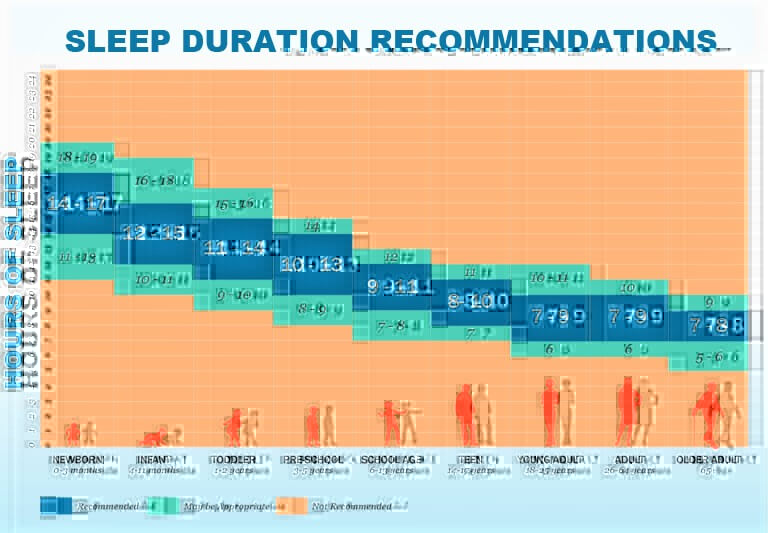We as a whole understand that getting to sleep is crucial for our physical condition all in all. It’s essential for your body system, your mind and every important ability in your own body system. On the off chance that we relax more, we can be more effective and we can finish our typical tasks with no problems.
We all need a goodnight sleep, especially people who are suffering from chronic diseases and pain management problems. So, the question remains – how many hours do you have to sleep, according to your age? Before we answer that for you, you should know that sometimes it’s different for everyone – take this for example, someone sleeps just 4 hours and still can finish his everyday tasks through the day successfully
Note: the infographic bellow was presented by the National Institute of Sleep. This infographic will show you how much sleep do you really need. And you should remember that this is the total sleep you will get through a 24-hour period. So, if you take a 30-minute nap, you should know that this counts too.
Just take a look at the infographic and you will find out if you are getting enough or less sleep. And, be careful, because lack of sleep can cause a slew of serious and life-threatening conditions, ranging from cancers to diabetes, and heart issues.
That’s why you should be aware that lack of sleep can be very bad for you and if you have any problems with it, you should change your sleeping habits or start using some homemade remedies that can help with your sleep.

Here are 7 reasons why you should pay close attention to your sleeping habits:
1. BACK PAIN
Back pain can make our lives really difficult sometimes. You won’t be able to move or even stand up. If you sleep too much, it can make you more prone to back pain since it weakens the muscles on your back. So, instead of staying in bed, do some low-intensity exercises to strengthen your back muscles.
2. OBESITY
How this works – well, staying too long in bed can mix your metabolism, so instead of using energy – you will store it. A recent study has discovered that the participants who slept for ten hours a night were more likely to become obese 6 years afterwards than those who slept 8 hours.
3. DEPRESSION
Depression can affect your sleep in two ways, and it’s always expressed by oversleeping or insomnia. About 15% of people who suffer from depression are sleeping all the time. Oversleeping can have a negative impact on the mental health and hamper the recovery.
4. HEADACHES
Chronic sleeping can also cause chronic headaches. You should also know that this damages certain neurotransmitters, like serotonin. As a consequence, the person can suffer from poor quality sleep overnight as well as headaches during daytime.
5. DIABETES
Sleeping too much can reduce the ability of your body to process glucose, and this may lead to type 2 diabetes or insulin resistance over time. A study has discovered that those who slept less or more than the recommended were more likely to develop impaired tolerance to glucose and diabetes compared to those people who had normal sleeping habits.
See also: Swallow This, Fall Asleep Almost Instantly, Stay Asleep, And Wake Up Refreshed
6. HEART DISEASE
Sleeping too much can be bad for you, especially your heart. According to the Nurses’ Health Study that examined the sleeping habits of 72,000 women, those women who slept about 11 hours every night were more likely to suffer from coronary heart disease compared to those that had eight hours of sleep at night.
HOW TO OVERCOME OVERSLEEPING
- Make a Sleep Schedule – yes, you should make a strict schedule that is compatible to your lifestyle. Make sure you unplug all devices one hour before going to sleep, meditate or practice yoga, and plan the time-sensitive activities so you could easily get out of bed in the morning.
- Shower – you should definitely take a cold shower every time you feel sleepy. Even if you want to increase the heat, this will make you sleepier.
- Work out – did you know that exercising right after you wake up will clear your mind, boost the energy levels, and make your ready for the day!
- Drink water – or, you can drink a glass of lukewarm water after you wake up to stay hydrated during the day. Every time feel sleepy drink up to increase your energy levels!
- Maintain your motivation – how this works: well, you should find an interesting activity and adhere to it. This way you will stay motivated and avoid sleeping as an escape from your life.
Source
Source
naturalhealingmagazine.net
 Freshsein
Freshsein